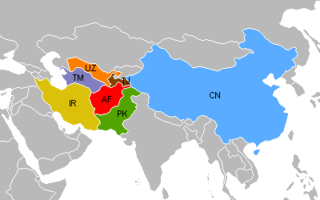United Nations Security Council Resolution 1746, adopted unanimously on March 23, 2007, after reaffirming all resolutions on the situation in Afghanistan, including resolutions 1659 (2006) and 1662 (2006), the Council extended the mandate of the United Nations Assistance Mission in Afghanistan (UNAMA) for an additional period of twelve months, until March 23, 2008.

United Nations Security Council Resolution 1917, adopted unanimously on March 22, 2010, after recalling its previous resolutions on Afghanistan, in particular resolutions 1868 (2009), 1662 (2006) and 1659 (2006), the Council extended the mandate of the United Nations Assistance Mission in Afghanistan (UNAMA) until March 23, 2011 and realigned its mandate to assist with government-led recovery efforts.
United Nations Security Council resolution 1193, adopted unanimously on 28 August 1998, after recalling Resolution 1076 (1996) concerning Afghanistan, the Council discussed the deteriorating political, military and humanitarian situation in Afghanistan during the ongoing civil war in the country.

United Nations Security Council resolution 1214, adopted unanimously on 8 December 1998, after recalling resolutions 1189 (1998) and 1193 (1998) concerning Afghanistan, the Council discussed the deteriorating political, military and humanitarian situation in Afghanistan and established a civil affairs unit as part of the United Nations Special Mission to Afghanistan (UNSMA).

United Nations Security Council resolution 1272 was adopted unanimously on 25 October 1999, after recalling previous resolutions on East Timor, particularly resolutions 384 (1975), 389 (1976), 1236 (1999), 1246 (1999), 1262 (1999) and 1264 (1999). The council established the United Nations Transitional Administration in East Timor (UNTAET) that was responsible for the administration of the territory until its independence in 2002.

United Nations Security Council resolution 1333, adopted on 19 December 2000, after recalling all resolutions on the situation in Afghanistan, including Resolution 1267 (1999), called for a ban of military assistance to the Taliban, closure of its camps and an end to the provision of sanctuary of the movement.

United Nations Security Council resolution 1383, adopted unanimously on 6 December 2001, after reaffirming all resolutions on the situation in Afghanistan, particularly Resolution 1378 (2001), the Council endorsed the Bonn Agreement signed the previous day concerning the transition period in the country following the U.S. invasion and preceding the establishment of permanent institutions.

United Nations Security Council resolution 1386, adopted unanimously on 20 December 2001, after reaffirming all resolutions on the situation in Afghanistan, particularly resolutions 1378 (2001) and 1383 (2001), the Council authorised the establishment of the International Security Assistance Force (ISAF) to assist the Afghan Interim Authority in the maintenance of security in Kabul and surrounding areas. It was the final Security Council resolution adopted in 2001.
United Nations Security Council resolution 1390, adopted unanimously on 16 January 2002, after recalling resolutions 1267 (1999), 1333 (2000), 1363 (2001), 1368 (2001), 1373 (2001) 1378 (2001) and 1383 (2001) concerning the situation in Afghanistan and terrorism, the Council imposed further sanctions on Osama bin Laden, Al-Qaeda, the Taliban and others associated with them.

United Nations Security Council resolution 1401, adopted unanimously on 28 March 2002, after recalling all previous resolutions on the situation in Afghanistan, including resolutions 1378 (2001), 1383 (2001) and 1386 (2001), the Council endorsed the establishment of the United Nations Assistance Mission in Afghanistan (UNAMA). It would replace the longstanding United Nations Special Mission to Afghanistan.

United Nations Security Council resolution 1419, adopted unanimously on 26 June 2002, after reaffirming all resolutions on the situation in Afghanistan, particularly Resolution 1383 (2001) and resolutions 1368 (2001) and 1373 (2001) on terrorism, the Council commended the country for the successful conduct of an emergency loya jirga and called for co-operation from the Afghan people with the Transitional Administration.

United Nations Security Council resolution 1453, adopted unanimously on 24 December 2002, after reaffirming all resolutions on the situation in Afghanistan, the Council endorsed the "Kabul Declaration on Good-Neighbourly Relations" signed by the Afghan government and six neighbouring countries on 22 December 2002.

United Nations Security Council resolution 1471, adopted unanimously on 28 March 2003, after reaffirming all resolutions on the situation in Afghanistan, the Council extended the mandate of the United Nations Assistance Mission in Afghanistan (UNAMA) for an additional period of twelve months until 28 March 2004.

United Nations Security Council resolution 1510, adopted unanimously on 13 October 2003, after reaffirming all resolutions on the situation in Afghanistan, particularly resolutions 1386 (2001), 1413 (2002) and 1444 (2002), and resolutions 1368 (2001) and 1373 (2001) on terrorism, the council extended the authorisation of the International Security Assistance Force (ISAF) for a period of one year and expanded its operations outside the capital Kabul to other areas.

United Nations Security Council resolution 1536, adopted unanimously on 26 March 2004, after reaffirming all resolutions on the situation in Afghanistan, particularly Resolution 1471 (2003), the council extended the mandate of the United Nations Assistance Mission in Afghanistan (UNAMA) for an additional period of twelve months until 26 March 2005.
United Nations Security Council Resolution 1943, adopted unanimously on October 13, 2010, after reaffirming all resolutions on the situation in Afghanistan and terrorism, including resolutions 1267 (1999), 1368 (2001), 1373 (2001), 1386 (2001), 1510 (2003), 1822 (2008), 1833 (2008), 1890 (2009), 1904 (2009) and 1917 (2010), the Council extended the authorisation of the International Security Assistance Force (ISAF) operating in the country for a period of one year.

United Nations Security Council resolution 1589, adopted unanimously on 24 March 2005, after reaffirming all resolutions on the situation in Afghanistan, particularly Resolution 1536 (2004), the council extended the mandate of the United Nations Assistance Mission in Afghanistan (UNAMA) for an additional period of twelve months until 24 March 2006.

United Nations Security Council Resolution 1974, adopted unanimously on March 22, 2011, after recalling previous resolutions on Afghanistan, in particular 1917 (2010), the Council extended the mandate of the United Nations Assistance Mission in Afghanistan (UNAMA) for a period of one year until March 23, 2012.

United Nations Security Council Resolution 1659, adopted unanimously on February 15, 2006, after recalling previous resolutions on the situation in Afghanistan, particularly resolutions 1378 (2001), 1383 (2001) and 1589 (2005), the Council endorsed the "Afghanistan Compact" between the Afghan government and international community concerning the future of the country.

United Nations Security Council Resolution 1662, adopted unanimously on March 23, 2006, after reaffirming all resolutions on the situation in Afghanistan, including resolutions 1589 (2005) and 1659 (2006), the Council extended the mandate of the United Nations Assistance Mission in Afghanistan (UNAMA) for an additional period of twelve months.














